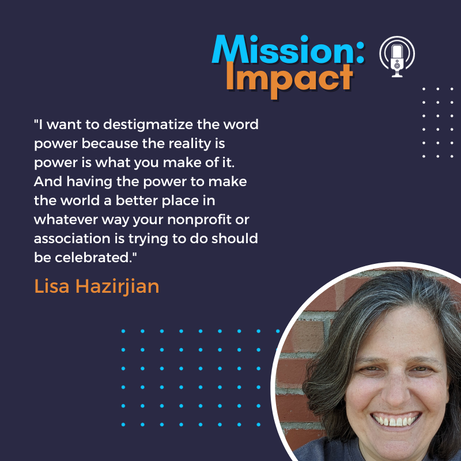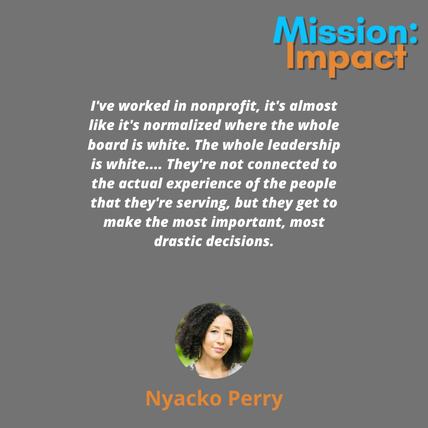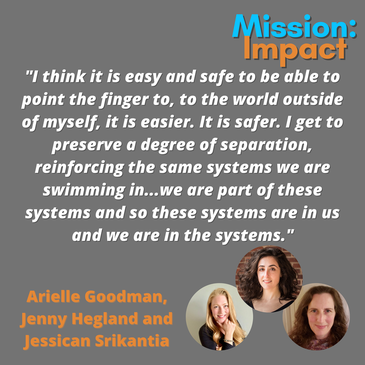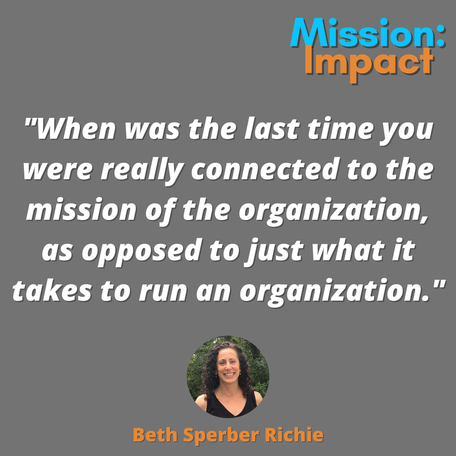Mission: Impact podcast & blog
Build a better world without becoming a martyr to your nonprofit cause
Listen on:
 In episode 98 of Mission: Impact, Carol Hamilton hosts Danielle Marshall for another learning out loud episode where we do a deep dive into a topic. Today’s topic is leadership in the nonprofit sector, especially the declining interest in nonprofit leadership as highlighted by the "Push and Pull" report by the Building Movement Project. We explore the dual reactions of frustration and affirmation in response to the report, discuss the challenges and support needs of nonprofit leaders, particularly BIPOC leaders, and emphasize the importance of culturally relevant support, universal design, and sustainability in leadership roles. Episode Highlights - [00:06:01] The "Push and Pull" report by the Building Movement Project, tracks the declining interest in nonprofit leadership roles, a persistent issue in the sector. - [00:07:25] The importance of training, mentoring, and coaching, and reflects on her own experience of not knowing she could negotiate for executive coaching. - [00:08:41] The added challenges faced by BIPOC leaders, including gaps in board and staff support and heightened expectations for rapid change. - [00:010:54] The unrealistic expectations placed on nonprofit leaders and the renegotiation of work-life balance. - [00:012:59] The additional pressure on BIPOC leaders who serve communities they identify with, dealing with systemic oppression and trauma patterns. - [00:15:00] Rethinking Leadership Roles with culturally relevant support and universal design and its potential benefits for creating more inclusive and supportive leadership roles. - [00:23:30] The trend of having co-executive directors. Potential and challenges. - [00:28:30] The challenge of always adding new expectations and the importance of focusing on sustainability. - [00:31:01] The importance of boards and staff supporting executive directors in carving out time for development and peer support. The conversation underscores the complexity of nonprofit leadership, the need for systemic changes to support leaders better, and the importance of culturally relevant and sustainable support systems to encourage more people to step into these critical roles. Guest Bio:
Danielle is an inclusive leader focused on strengthening collaboration among teams, leaders, and stakeholders to foster problem-solving, create solutions, and improve culture. She finds her inspiration in leading systemic change work that promotes equity and inclusion. Danielle founded Culture Principles in response to a persistent need to operationalize Racial Equity, Diversity, and Inclusion metrics, centering REDI goals and creating accountability systems. She supports clients through her Mapping Equity Framework focused on Unearthing Knowledge, Elevating Strategy, and Transforming Sustainability. She centers her work around organizational assessment, racial equity learning intensives, and the development of racial equity action plans. Understanding that each organization arrives at this work from different perspectives, she utilizes assessment in building a customized strategy for each unique partner. Previously Danielle served as a non-profit leader for 20+ years and today works on strategy development that enables nonprofits to achieve equitable mission-driven results. Danielle holds a Master's degree in Industrial-Organizational Psychology from Louisiana Tech University and draws on her background as an I/O psychologist in applying a racial equity lens to organizational policies, practices, and programs. She is a Certified Diversity Professional (CDP)/ Executive Coach (ACC). During her playtime, you can find Danielle traveling, knitting, and kayaking in all 50 states. Important Links and Resources: The Push and Pull: Declining Interest in Nonprofit Leadership Related Episodes: E72: Exploring Passion Exploitation with Lauren Brownstein E78: Renegotiating our relationship with work with Carol Hamilton E92: Three stages of nonprofit leadership with Patton McDowell E95: Building shared nonprofit leadership with Emily Taylor Click "Read More" to view a transcript of the interview  Carol Hamilton interviews Lisa Hazirjian, a historian turned advocate, as they delve into Lisa’s unexpected journey from academia to the forefront of nonprofit advocacy. Through a candid recount of personal challenges and professional transitions, Lisa shares her story, motivations, and the lessons she’s learned along the way. Some of the conversation’s highlights: Motivation for Advocacy: Personal emotions during times of loss and the desire to effect change in public policy were Lisa’s primary motivators to engage in advocacy work. Nonprofit Misconceptions: Lisa corrects the common misconception that nonprofits cannot engage in policy advocacy, stressing that they can and should, as they often hold valuable expertise that can inform policymaking.
Strategic Advocacy: Despite political power dynamics, Lisa argues that effective advocacy is less about which party is in power and more about the ability to influence decision-makers through strategic engagement and communication. Building Relationships: The importance of building relationships before needing to make an ask is highlighted, with suggestions to conduct surveys and use supporters as effective messengers to lawmakers. Volunteer Engagement: Discussion of a “ladder of engagement” approach to progressively involve volunteers in advocacy work, starting with simple actions and building up to higher responsibilities. Training and Responsibility: Emphasizing the need to train volunteers not just for tasks but also for understanding the bigger picture, the narrative includes a personal story demonstrating this practice. Small Wins and Community: Acknowledging small victories and the value of creating a sense of community among advocates is presented as crucial for maintaining motivation and momentum in long-term policy campaigns. For the transcript and more information click here:  In episode 11 of Mission: Impact, some of the topics that Carol and her guest, Nyacko Perry, discussed include:
Additional Resources:
BoardSource 2017 research on demographics of nonprofit organizations - Leading with Intent report. Guest Information: Nyacko Perry utilizes a systems-thinking approach to assist individuals, community groups, and organizations, in creating more inclusive cultures. Her decade long career as a transformational change agent includes national and international facilitation with non-profit, corporate, and government agencies. Nyacko is the founder of Yin Consulting, a collaborative focused on personal, organizational and systemic healing. She is the Organization Development Partner at the much-anticipated Comfort Kitchen, a restaurant, community meeting space, and a food incubator dedicated to fostering collaboration, cross-cultural understanding, and community engagement. Nyacko also serves as a member of the Advisory Board for the Action Boston Community Development, Inc. Roxbury/N. Dorchester Opportunity Center. Nyacko holds an M.S. in Organization Development, with distinction, from American University. She is also a 500-hour professional level yoga teacher, an Afro Flow Yoga® certified teacher, and weaves her mindfulness expertise into her consulting work. Links:
Click "Read More" for transcript:  This week we’re talking to Arielle Goodman, Jenny Hegland and Jessica Srikantia. We talked about:
Resources mentioned: Otto Schwarmer and the MIT Presencing Institute www.ottoscharmer.com/ www.presencing.org/ Thomas Huebl thomashuebl.com/ Arielle, Jenny and Jessica are a team of colleagues that has been working together for the past six months to discover how they might be of service as a collective. Their work exists in cultivating the spaces between, such as in-between people during times of transition and not knowing, spaces within our own selves, or the connective tissue of complex systems. Together, they explore what is possible in and from wholeness. They are committed to transforming themselves into alignment with life, so that they can support this work in the broader world inclusive of and beyond their individual selves. Their areas of expertise include navigating uncharted terrain in times of uncertainty, helping systems see and sense themselves, and practicing sacred relationships with team and stakeholder groups. Links: www.linkedin.com/in/jennyhegland www.linkedin.com/in/jessica-srikantia-206797173/ www.linkedin.com/in/ariellegoodman/ Click "Read More" for Transcript:  This week we’re talking to Beth Sperber Richie. We talked about: • What is burn out is and why burn out is so prevalent in the nonprofit sector • What the research shows about rest and productivity for organizations. • What vicarious trauma is and how it impacts nonprofit staff and an organization’s culture. Beth Sperber Richie, Ph.D. is a licensed psychologist and consultant in private practice in the Washington, D.C. area. Dr. Richie works with non-profit leaders on how to sustain their staff and their mission given the grind of social change work. She gives workshops and presentations on managing stress and burnout, vicarious trauma and compassion fatigue, improving cross-cultural communication and counseling skills and setting boundaries for front-line employees. Her workshops focus on practical skills and engaged involvement of all participants. Beth on LinkedIn Click "Read More" for Transcript: |
Categories
All
Archives
July 2024

Grace Social Sector Consulting, LLC, owns the copyright in and to all content in and transcripts of the Mission: Impact podcast, as well as the Mission: Impact blog with all rights reserved, including right of publicity.
|
Telephone301-857-9335
|
info[at]gracesocialsector.com
|
Grace Social Sector Consulting, LLC, owns the copyright in and to all content in, including transcripts and audio of the Mission: Impact podcast and all content on this website, with all rights reserved, including right of publicity.
|